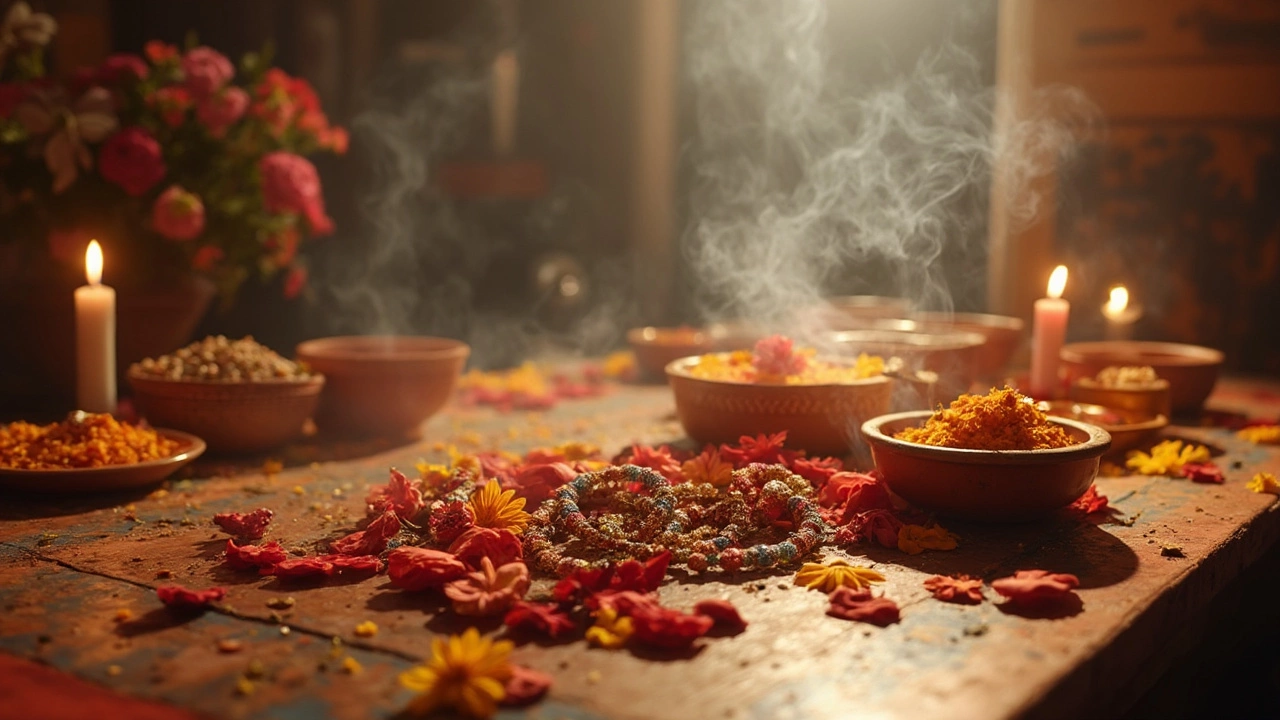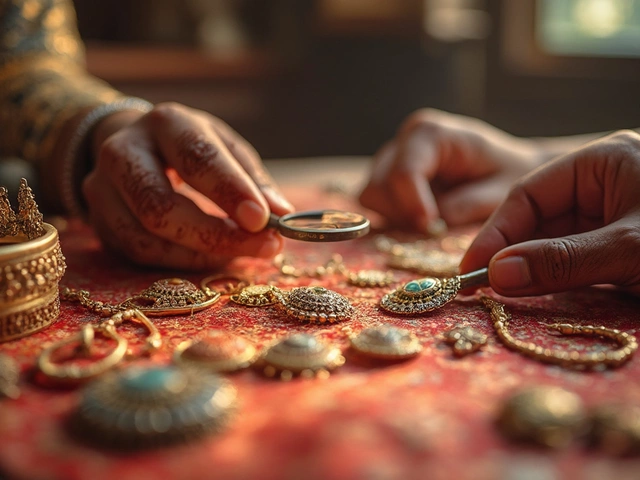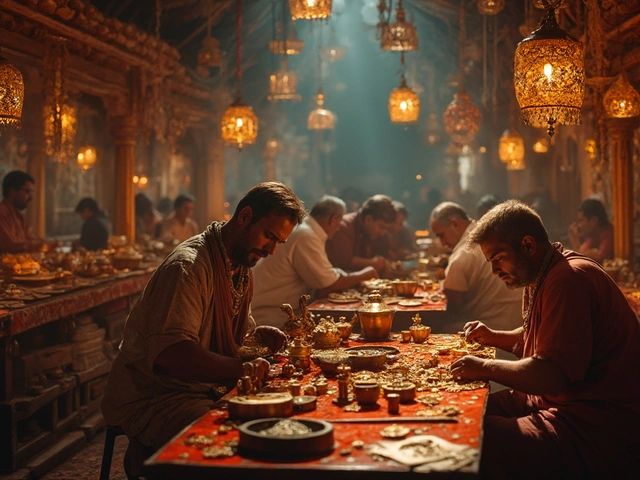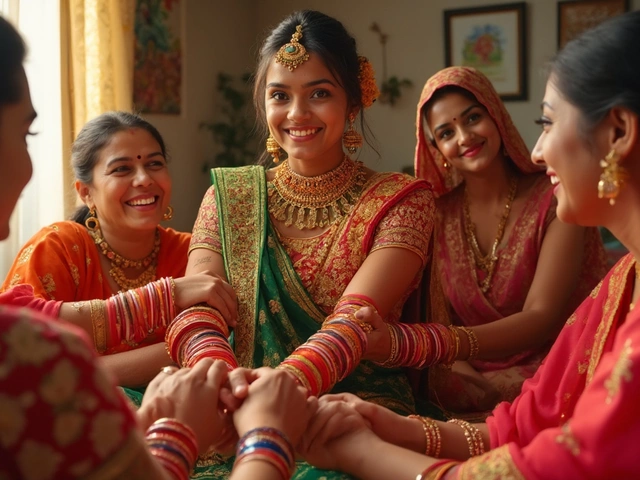
Have you ever wondered why breaking glass is such a big deal in Hinduism? You drop a glass, it shatters, and suddenly everyone is talking about omens and signs. Now, whether you think it's bad luck or just a bit of a mess doesn't matter much here. It's all about what it means in Hindu culture, where glass isn't just a practical material but a symbol loaded with meaning.
For some, breaking glass is a sign of bad luck. Maybe it reminds folks of mishaps or things falling out of balance. But that's not the whole story. Others believe that when glass breaks, it can actually be a good thing. Sound strange? Think of it as breaking away the old and bringing in something new, pushing away negative energies, and starting fresh.
And let's not forget about those beautiful glass bangles that are a staple in Indian tradition. They're not just worn for show. These bangles have deep roots in rituals and carry significant meaning in various ceremonies. Breaking them might seem like a big no-no, but it’s also seen by some as a symbol of transformation, especially in changing life circumstances. Sounds complex, doesn't it?
- Symbolism of Glass in Hindu Culture
- Breaking Glass: Bad Luck or New Beginnings?
- Glass Bangles and Ritual Significance
- Personal Stories and Interpretations
- Balancing Tradition with Modern Views
Symbolism of Glass in Hindu Culture
Glass in Hindu culture holds a unique spot, mainly because its symbolism stretches well beyond just windows and mirrors. It often represents clarity and focus. You see, the way light passes through glass smoothly is seen in Hindu thought as a reminder to maintain purity and transparency in our lives.
However, glass isn't just a symbol of purity. It's pretty interesting how it plays into life's unpredictability. Imagine how fragile glass can be. It's just like how fast things can change in life. Sometimes, this fragility is a reminder of the delicate balance in nature and relationships, emphasizing that it can all shift in the blink of an eye.
Speaking of balance, glass bangles are a key part of this discussion too. They carry significant cultural and spiritual weight in India, especially among women. These bangles aren't just colorful accessories; they're loaded with meaning. They're said to bring good luck and are linked with the wearer's marital status and health.
The symbolism extends even further in wedding rituals. Glass bangles play an essential role during these ceremonies, highlighting their power to protect and bless individuals. The sound of glass bangles clinking together is thought to ward off negative energies and keep the household vibes positive.
The widespread cultural use and spiritual importance attached to glass make breaking it a big deal. While some view breaking glass as bad luck, it's more about interpreting what that could mean. Is it a warning? A sign of transformation? Hinduism leaves a lot for personal interpretation, giving room for people to make their own understanding of such events.
Breaking Glass: Bad Luck or New Beginnings?
So, what's the deal with breaking glass in Hindu traditions? It's one of those things that can really get people talking. Some say it's pure bad luck, but others see it as an opportunity for a fresh start. Let's break it down (pun intended).
First off, the idea of breaking glass as a bad omen has roots in the idea of fragility and loss. It's like when something important to you breaks, and you're left with a mess. In many households, if glass shatters unexpectedly, it might be seen as a sign that something unfortunate could be on its way.
But here's the twist. There are also folks who think of breaking glass as a way to usher in new beginnings. In fact, for some, the act clears away negativity, making room for positive changes. You'll even find people who break glass intentionally during significant life changes or ceremonies to symbolize moving on from the past.
For traditional Indian bangles, the scenario is even more interesting. These are often made of glass and are loaded with symbolism in marriages and other rituals. While it might seem bad to break them, some communities consider it a sign that a particular chapter is over and something fresh is about to begin.
So, is breaking glass all doom and gloom or rather exciting and transformative? It largely depends on how you view it—or maybe even what you need it to mean in your life. That’s the fascinating thing about beliefs—they can shift and adapt based on personal experiences and cultural significance.

Glass Bangles and Ritual Significance
Glass bangles aren’t just pretty accessories in India; they’re steeped in cultural significance and tied deeply to Hindu rituals. When talking about traditional Indian bangles, these vibrant glass creations often stand out. They're more than jewelry; they're part of a bride's trousseau, worn for auspicious reasons and as a sign of marital status.
For many Indian women, wearing glass bangles is a must during festivals and celebrations like Diwali, Karva Chauth, and weddings. These bangles symbolize good fortune, prosperity, and long life for their husbands. The color and the sound of these bangles are also thought to hold spiritual significance. For instance, red bangles are popular for weddings as they signify energy and fertility, while green is all about luck and fertility.
Breaking a bangle, on the other hand, might seem like a horror movie scene to some, especially with these meanings attached, but it’s not automatically a terrible omen. In certain contexts, it represents a change or a transition, like moving from one phase of life to another, which can actually be positive.
Historically, these bangles come from the glass-making tradition in places like Firozabad, the 'City of Bangles,' in India, which produces millions of them every year. It's a bustling industry deeply entwined with cultural practices, supplying the demand across India and even abroad.
So, while breaking a bangle might cause a gasp or two, its significance is intertwined with the belief systems and varied rituals across India. It’s not just about luck or misfortune; it’s about what these symbols represent in one's life journey.
Personal Stories and Interpretations
Diving into personal stories, you'll quickly find that interpretations of glass breaking in Hinduism are as diverse as the culture itself. Many families have unique beliefs passed down through generations. For example, some firmly hold that if a glass breaks on an auspicious day, it could attract misfortune. Yet, on the flip side, there are families who see it as a way to cleanse the environment of bad vibes.
Consider the case of Priya Desai from Mumbai. She shares, "When I accidentally broke my grandmother’s favorite glass bangle, my mother smiled and said it meant the end of a difficult phase. A week later, I aced my exams! Maybe it’s coincidence, or maybe it’s the bangle." Her story reflects a more positive spin, where broken traditional Indian bangles are seen as heralds of good news or change.
"In Hindu culture, breaking of glass is often perceived as the breaking of negativity surrounding you," says Dr. Anjali Verma, a respected cultural historian from Delhi University.
Interestingly, some folks blend their beliefs with modern views, like Vidya from Sydney. She doesn't put much stock in superstitions but acknowledges the comfort they bring to her elders. "If my grandma is relieved when a glass breaks because she thinks it avoids bigger mishaps, who am I to argue?" Vidya says with a laugh.
These stories show that while some might strictly interpret broken glass as bad luck based on traditional tales, others find a silver lining. It's all about perspective and often, how we choose to see these events shapes our reality more than the event itself.

Balancing Tradition with Modern Views
In a world that's constantly changing, where technology and modern beliefs are always in the mix, how do traditional views hold up? Especially when it comes to something as intriguing as the beliefs around breaking glass in Hinduism. The younger generation often finds themselves in a tug-of-war between maintaining age-old traditions and embracing a more modern mindset.
Take traditional Indian bangles, for instance. They're more than just accessories; they're steeped in history and symbolism. But today, some people see them as old-fashioned. On the flip side, there's been a revival, with many rediscovering their cultural roots through these very items. It seems like a balancing act—celebrating heritage while still evolving with the times.
Here's an interesting point: while many families hold on to the idea that breaking glass is unlucky, others reinterpret these incidents as a chance for something new. This shift might seem small, but it shows a broader trend of mixing traditional beliefs with personal interpretations that fit today's lifestyle.
Let's not forget the suburban hustle and bustling cities, where beliefs can evolve as people from different backgrounds interact. In these melting pots, some families might let go of old beliefs they once held firmly. Others might keep them alive, finding comfort in certain rituals and symbols.
In the end, whether you're sticking to the old ways or welcoming the new, what's clear is that these beliefs keep adapting. And maybe that's how traditions stay relevant—they mold and shift a bit while still holding onto their essence.


